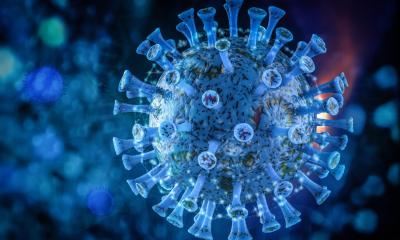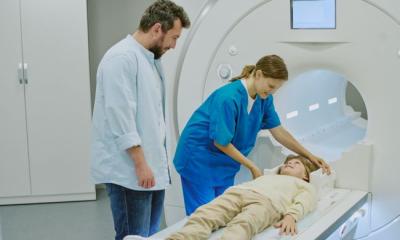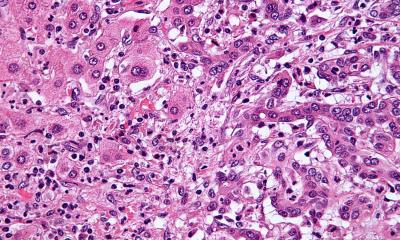Article • Covid-19's impact on studies
Clinical trials during the pandemic: lessons for future cancer research
The continuing corona virus epidemic has impacted strongly on cancer care and research, including the delay of treatments and diagnoses as well as on trials of new therapies, and the shift in research to develop a Covid-19 vaccine. However, the session ‘Cancer research and Covid-19’, during the National Cancer Research Institute (NCRI) Virtual Showcase (online 2-3 November) looked at how UK healthcare teams were endeavouring to tackle those challenges.
Report: Mark Nicholls

In her presentation ‘Embedding trials into clinical practice – Learning from the Covid-19 crisis’, Dr Helen Winter (University of Bristol, and Bristol Cancer Institute, University Hospitals Bristol and Weston NHS Trust) discussed the clinical research and trial response to the pandemic; how clinical trials had been conducted and delivered against the backdrop of coronavirus, and what future cancer research could learn from these.
Putting further cancer research on hold was unthinkable for patients, she stressed, because there had already been delays in diagnosis and investigations and restricted access to treatments, clinical trials and new novel treatments. ‘The impact of that on outcomes for cancer patients still remains unclear,’ Winter added.
To further develop patient care and find new and effective treatments, she said, rapid adoption of clinical research within a healthcare setting, as demonstrated with Covid-19 research, is needed, with a cross-discipline commitment to research. Teams were established at her Bristol unit to form a Covid-19 research clinical group led by Professor Jane Blazeby. This drew together personnel from disciplines including surgery, oncology, paediatrics, ICU and respiratory care, to deliver well-facilitated and well-executed clinic trials across observational and interventional studies.
Winter cited the RECOVERY study – examining possible treatments for Covid-19 - as an example and, from a cold start in March, how this saw rapid approval and recruitment, with subsequent amendments made throughout the summer. With cancer clinical trials halted, Winter detailed how Covid-19 research has become embedded within every-day clinical practice within NHS organisations during the pandemic and such research is now the daily norm among Covid-19 clinical teams.
Through collaboration and teamwork, Dr Natalie Blencowe, a Clinician Scientist for the Medical Research Council, led the study and training of junior and senior doctors to optimise recruitment. There was close liaison with the research nurses and all protocol amendments were implemented swiftly. In addition, Winter said: ‘It was a collective effort,’ said Winter. ‘With weekly meetings sharing best practice, what was learned, the challenges, and with senior triallists sharing expertise and transferrable skills.’
What was learned, she continued, is the need to act quickly, having a breadth of portfolio to capture patients at any stages, and obtaining ‘buy-in’ from junior doctors and relevant training in acute settings to gain informed consent for participation. ‘At the other end, there was a very coordinated approach to publications.’ This underlined the need to deliver trials in a way to optimise all those who are eligible and want to participate, Winter added. By harnessing momentum and initiatives in recruitment into Covid-19 trials, she concluded, it is hoped to have a future impact on shaping cancer studies and in embedding research into clinical practice. Whether the lessons learned from rapid adoption of Covid-19 research can counter-balance the negative effects on cancer care from the pandemic – and be applied to future cancer trials - is an area worthy of more research, Winter pointed out.
Other session presentations looked at the development of a model to predict hospital admission and severe outcome in cancer patients with Covid-19; improving research capacity in the health service post Covid-19; the impact of virtual triage in the Rapid Diagnostic Service in response to Covid-19; and national real-time monitoring and risk mitigation for cancer patients in the UK in the context of Covid-19.
Profile:
Dr Helen Winter is a consultant medical oncologist with the Bristol Cancer Institute and honorary senior research fellow at the University of Bristol. She is also the co-Clinical Research Specialty Lead for Cancer, for the NIHR Clinical research Network (NIHR CRN) West of England. She has a longstanding interest in the delivery of trials, increasing access to translational research and in novel approaches to improving outcomes for cancer patients.
04.02.2021





